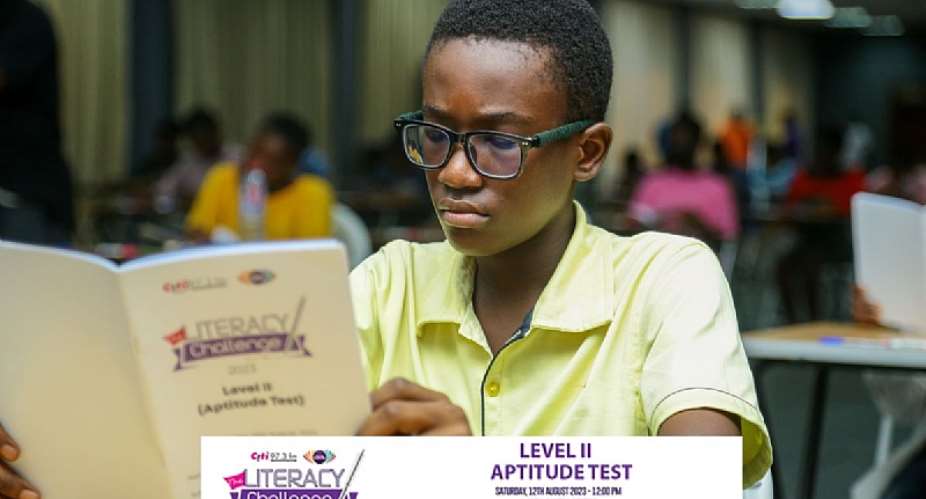The French philosopher, scientist and mathematician René Descartes once said that the reading of good books is akin to conversing with the finest minds of past centuries. Regardless of whether one embraces this perspective or not, Descartes’ statement echoes with indisputable truth. A stroll through the annals of history unequivocally reveals that the myriad comforts and innovations we presently relish, be it strides in healthcare, the omnipresence of cell phones, the advent of high-speed internet connectivity, or the groundbreaking developments spearheaded by entities such as OPENAI, owe their existence to individuals akin to ourselves, who dedicated substantial portions of their lives to the pursuit of knowledge through extensive reading. In reflecting upon Ghana’s current reading landscape, one cannot help but ponder the implications of a nation gradually losing interest in the written word. This disinterest in reading, particularly among Ghanaians of all ages, raises concerns that extend beyond personal development into the realms of education, innovation, economic prosperity, civic engagement and cultural preservation.
At the forefront of these concerns is the impact on Ghana’s global competitiveness. In an era where information and adaptability are crucial for international success, a populace indifferent to reading may find itself trailing behind in the global economy. The lack of interest in reading may lead to a workforce that struggles to keep pace with advancements and innovations, ultimately diminishing the nation’s competitive edge.
Moreover, the quality of education and innovation in Ghana may be compromised. Reading serves as the cornerstone for strong literacy skills, essential for comprehension, critical thinking and effective communication. Without a robust foundation in reading, the country may face challenges in fostering innovation and research.
Economic development, too, is at risk when a significant portion of the population eschews reading. The acquisition of new knowledge and skills, crucial for technological advancements and industry trends, becomes a formidable challenge in the absence of a reading culture. A skilled and knowledgeable workforce is imperative for a thriving economy, and the neglect of reading may impede Ghana’s economic growth.
Civic engagement and democracy are also adversely affected when reading takes a back seat. Reading plays a pivotal role in nurturing informed citizenship, and without it, Ghanaians may lack awareness of critical social and political issues. An uninformed electorate can pose challenges to the functioning of democracy and hinder the development of an active and informed civil society.
Furthermore, the health and well-being of the citizenry may be compromised, as reading is linked to cognitive stimulation and mental well-being. The absence of this intellectual engagement can contribute to higher stress levels and lower overall well-being among the population.
Equally important is the potential loss of Ghanaian culture. Reading serves as a vital tool in preserving and passing on cultural heritage, ensuring a connection with the past. Without a reading culture, there is a risk of losing touch with cultural traditions, folklore and historical narratives.
To address this critical issue, Ghana must embark on a multifaceted approach to promote reading interest across all demographics. Initiatives such as national reading campaigns, adult literacy programmes, and digital reading initiatives can play a pivotal role in fostering a love for reading. Leveraging technology for e-books, audiobooks, and online reading communities can make literature more accessible and appealing to a tech-savvy population.
Mobile libraries and literary outreach programmes can bridge the gap in remote and underserved areas, ensuring that all Ghanaians have access to reading materials. Community libraries and inviting reading spaces can further cultivate a culture of reading by providing comfortable environments for literary exploration.
Supporting local literature and incorporating Ghanaian stories into education curricula are essential steps towards celebrating cultural heritage through reading. Grants and incentives for local authors and publishers will contribute to the creation of diverse and high-quality literature that resonates with the people.
In conclusion, fostering a vibrant reading culture in Ghana is not just an educational imperative but a key driver of holistic development. By implementing these comprehensive measures, Ghana can cultivate a nation of readers, ensuring that the benefits of reading are accessible, enjoyable, and relevant to the diverse interests and needs of its population. Ultimately, the cultivation of a reading renaissance is not just about intellectual development but a multifaceted approach to advancing economic, social, political and technological progress.





 4,300 Liberians at Buduburam Refugee Camp to return home
4,300 Liberians at Buduburam Refugee Camp to return home
 Two dead in premix fuel depot explosion at Essikado-Ketan
Two dead in premix fuel depot explosion at Essikado-Ketan
 Driver of President Akufo-Addo convoy SUV dies in road crash
Driver of President Akufo-Addo convoy SUV dies in road crash
 Akufo-Addo's convoy in fatal crash
Akufo-Addo's convoy in fatal crash
 Mepe flood victims still in tents 8months after Akosombo Dam spillage
Mepe flood victims still in tents 8months after Akosombo Dam spillage
 Kpemka’s appointment as Deputy BOST MD is unconstitutional – Kwabena Donkor
Kpemka’s appointment as Deputy BOST MD is unconstitutional – Kwabena Donkor
 Voter registration: Two Togolese Nationals arrested in Buem for attempting to re...
Voter registration: Two Togolese Nationals arrested in Buem for attempting to re...
 DR Congo thwarts Kinshasa 'coup attempt': army
DR Congo thwarts Kinshasa 'coup attempt': army
 Media has made good progress in Ghana — Frema Opare
Media has made good progress in Ghana — Frema Opare
 Election 2024: NDC pledges to scrap betting tax, targets 80% youth support
Election 2024: NDC pledges to scrap betting tax, targets 80% youth support
